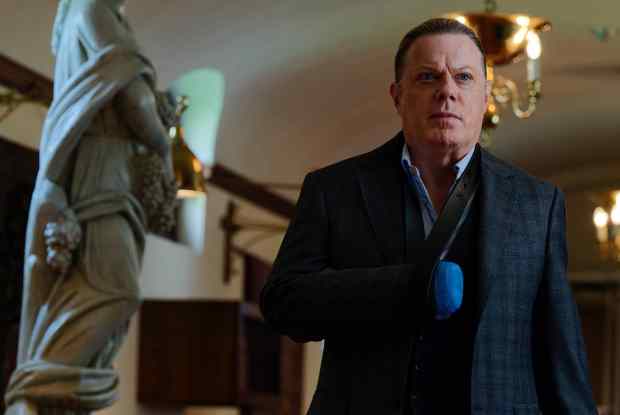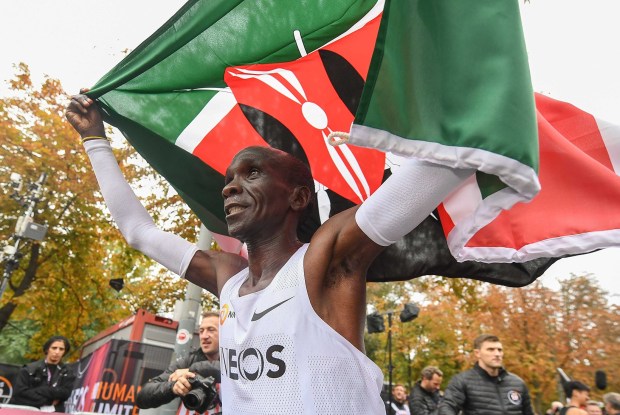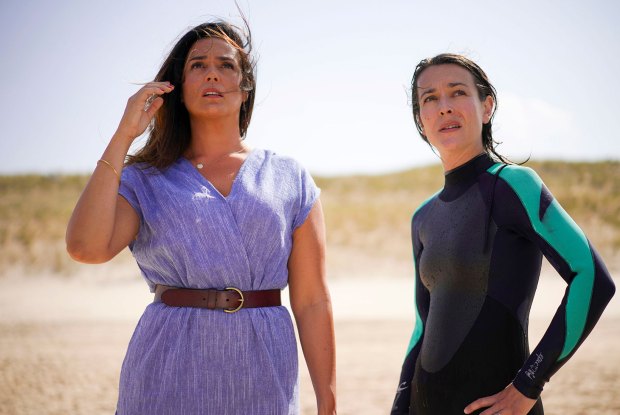Because the rise of the Nazis is a topic so rarely mentioned these days, least of all in schools, the BBC has produced a helpful three-part explainer of that title (BBC2, Mondays) showing why the story of Hitler is even more relevant today than it was in the 1930s.
Back in the day, the BBC might have been content to strive for an objective take on the subject, perhaps with a voiceover by Samuel West and lots of period footage. But the danger of that approach, the BBC has since realised, is that it runs the risk of viewers making up their own minds what to think. Some of them might not be aware, for example, of the obvious parallels between Hitler, Nigel Farage, Donald Trump, Brexit and, to a lesser extent, Michael Gove.
Enter former Cambridge historian Professor Sir Richard Evans, one of the diverse talking heads who pop up at regular intervals to interpret the story being acted out by young men in brown shirts, Himmler-impersonators, etc. Hitler said he wanted to ‘Make Germany Great Again,’ he explained, and specialised in ‘empty slogans’ which, though vague, were ‘very powerful’. Also, Hitler was a man who ‘represented himself as an ordinary bloke, as it were,’ he told us with
a sneer. Gosh, which contemporary politicians could he possibly have meant?
Actually, we don’t need to guess because Evans keeps telling us via his Remoaner tear-drenched Twitter account and also in articles such as the one he recently wrote for Prospect in which he compared contemporary British politics to those of the Weimar Republic, and attacking both Trump and ‘Johnson and Dominic Cummings and their unelected, hard-right government’ with its plans to ‘force through a disastrous no-deal Brexit without parliamentary approval and against the wishes of the majority of the population’.
Later we were warned by the acid voiceover, speaking of course in the historic present, that Hitler ‘has no interest in the opinion of experts’. I was surprised they didn’t get one of the other impeccably left-liberal talking heads — Helena Kennedy QC, maybe — to emphasise the key point that Michael Gove once expressed a similar view. But maybe they were short of space. After all, a few gaps had to be made available for the input from Ash Sarkar.
Unless you spend too much time on the internet, you probably won’t know who Ash Sarkar is. She is famous for three things: the time she boasted on TV to Piers Morgan about being ‘literally a communist’ as if it were an indisputably fun, groovy thing to be; the announcement on her Twitter profile that she ‘fucks like a champion’; and, most recently, the mini-furore generated by the fact that she — a hard-left activist who had expressed her support for a woman who sprayed anti-Israel graffiti on the walls of the Warsaw ghetto — should be invited as an expert witness in a documentary about Hitler.
As it turned out, Sarkar’s contributions were harmless to the point of irrelevance. Her job, it became clear, was to be a pretty brown female face and tick the right BBC diversity boxes rather than say anything insightful. ‘These people are after your head. They want to annihilate your existence altogether,’ she told us helpfully, so we could really get a feel of just how it must have been to be a communist pursued by the Nazis in the 1930s.
My favourite bit was when Nigel Farage popped up to point out the disturbing parallels between the way that the German speaker of the Reichstag — one Hermann Goering — deliberately looked the other way when Chancellor von Papen was trying to get his attention, thus ushering in an anti-democratic totalitarian regime that cared nought for constitutional procedure or parliamentary democracy. Oh, no wait, Farage wasn’t asked to contribute. This is the BBC, after all.
But the documentary it did on George Soros — Conspiracy Files: The Billionaire Global Mastermind? (BBC2, Sunday) — was worse, much worse. Soros is an intriguing and influential character, well worth a detailed investigation. Apart from the time he famously broke the Bank of England in 1992 when he caused sterling to crash out of the European Exchange Rate Mechanism, there’s the vexed issue of what the BBC calls his ‘philanthropy’, but which some of us might consider more akin to bankrolling the destruction of Western civilisation.
Soros has given away $32 billion to ‘liberal’ causes, ranging from his promotion of the global-warming scare to his campaigning for open borders which involves hefty donations to a number of unsavoury and sometimes violent hard-left activist groups. The documentary’s considered take on all this: Soros gives generously to ‘education, health, human rights and democracy projects’. People who think it’s any more sinister than that are mainly tattooed, racist, far-right conspiracy theorists — and Trump fans, if there’s any difference — whose hatred stems mainly from the fact that Soros is Jewish. I think it’s time the BBC gave up trying to pretend it’s a voice of impartial authority, don’t you?
Got something to add? Join the discussion and comment below.
Get 10 issues for just $10
Subscribe to The Spectator Australia today for the next 10 magazine issues, plus full online access, for just $10.
You might disagree with half of it, but you’ll enjoy reading all of it. Try your first month for free, then just $2 a week for the remainder of your first year.















Comments
Don't miss out
Join the conversation with other Spectator Australia readers. Subscribe to leave a comment.
SUBSCRIBEAlready a subscriber? Log in